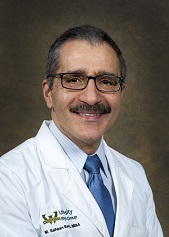
A new four-year study expected to have significant clinical implications in the management of patients with a combination of sleep disordered breathing and insufficient sleep is now enrolling participants.
Wayne State University’s Safwan Badr, M.D., M.B.A., chair and the Liborio Tranchida, M.D., Endowed Professor of Internal Medicine at the Wayne State University School of Medicine, and Jennifer

Martin, Ph.D., professor of Medicine at the David Geffen School of Medicine at the University of California, Los Angeles, are co-principal investigators of the study, “Improving outcomes for patients with SDB and insufficient sleep.”
Sleep disordered breathing afflicts an estimated 25 million adults in the United States. One-third of American adults suffer from insufficient sleep, defined as less than seven hours per night. Mild SDB is defined as having sleep apnea diagnosed by a sleep study with an apnea/hypopnea index ranging from 5 to 15 events per hour.
“Our study is based on the premise that insufficient sleep contributes to sleepiness in patients with SDB and may account for the variability in response to positive airway pressure therapy in patients with sleepiness and mild SDB,” Dr. Badr said. “The objective is to determine the treatment that results in the greatest benefit to patients in terms of daytime sleepiness, blood pressure and endothelial function.”
The study is funded by a five-year, $3,479,967 grant from the National Institutes of Health awarded in late 2019.
The study launched shortly before being put on hold due to the pandemic lockdown.
“We transitioned most of our study to using telehealth, which has become more common in health care overall,” Dr. Badr said.
The team restructured the study elements, which allowed the resumption of enrollment, either in person or virtually. The plan is to enroll about 500 participants during the next four years.
The COVID-19 pandemic has caused major disruptions and challenges for clinical research as the population adjusts to new daily routines.
While working from home may have eliminated commute time, the stress of the pandemic on lives and livelihoods is negative, ultimately leading to insufficient sleep. “Sleep is necessary in order to maintain a strong and healthy immune system. During this time of COVID, it is particularly important that we get sufficient sleep,” Dr. Badr said.
The study co-investigators include Susmita Chowdhuri, M.D; Samiran Ghosh, Ph.D.; Cheri McGowan, Ph.D.; Phillip Levy, M.D., M.P.H; James Rowley, M.D.; and Anan Salloum, M.D., at Wayne State University; and Cathy Alessi, M.D., and Peter Liu, M.D., at UCLA.
To participant in the sleep study, call 313-576-3548 or email fh9906@wayne.edu for more information.
The grant is 1R01HL146059-01A1 from the National Heart, Lung and Blood Institute of the NIH.